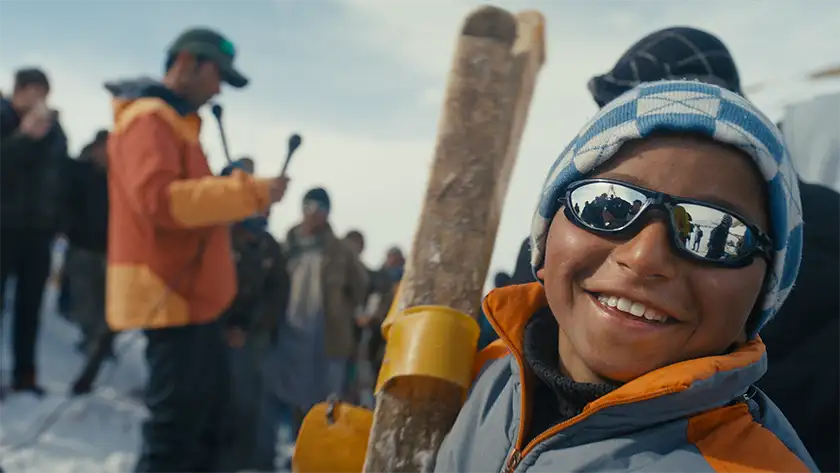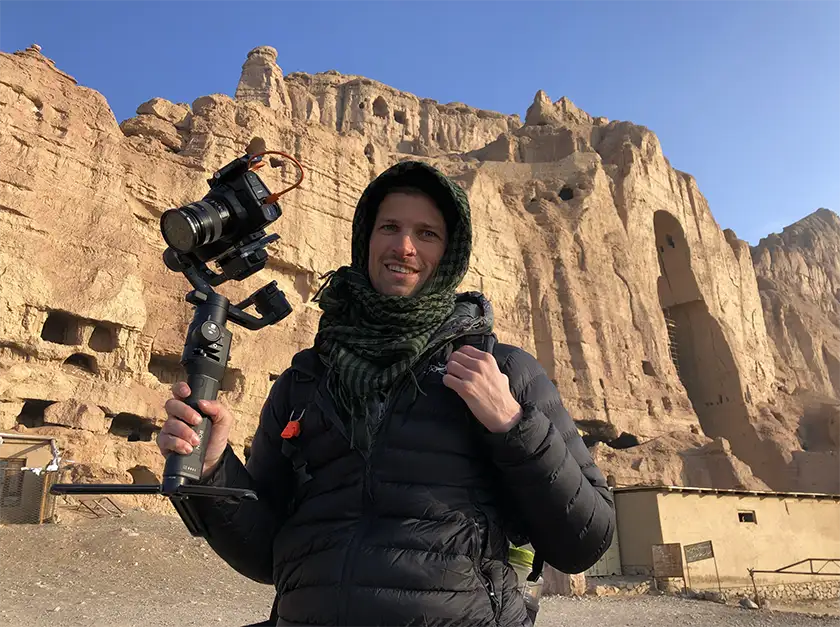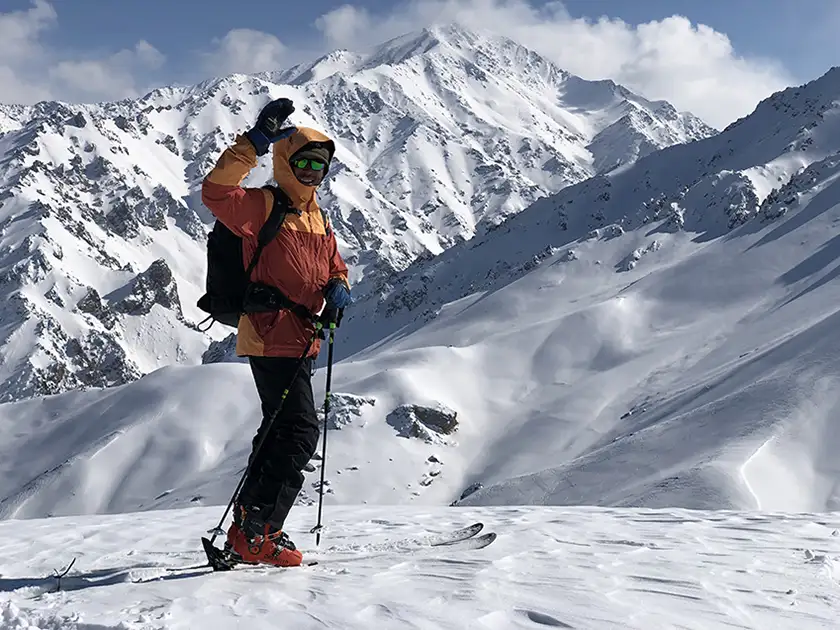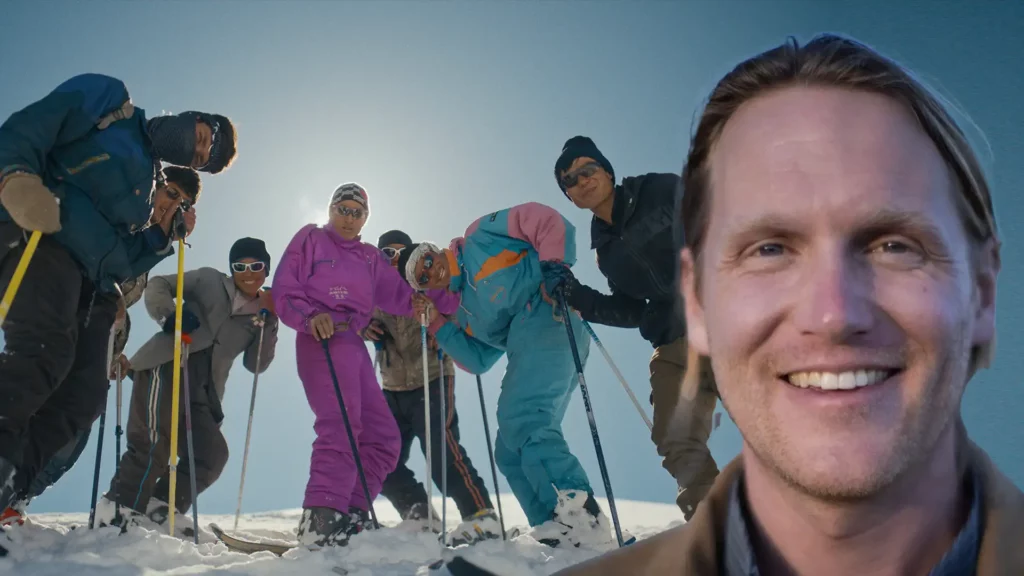We interview Champions of the Golden Valley director Ben Sturgulewski on his moving documentary, which sheds light on the athletes competing in the 2019 Afghan Ski Challenge.
During the Tribeca Film Festival, we interview director Ben Sturgulewski about his profoundly moving and extraordinarily impressive documentary, Champions of the Golden Valley. In 2019, Sturgulewski took to the mountain villages of Bamyan, Afghanistan to capture a ski competition that had earned worldwide acclaim. These villages are so passionate about skiing culture that many aspiring athletes who cannot afford or gain access to skiing equipment create their own ski gear to not miss out on the action. To these young people, skiing is far more than a sport.
At the height of the ski season lies the Afghan Ski Challenge, where local athletes compete for a championship title, a race that takes equal parts strength and equal parts heart in order to win. At the helm of the competition is former Afghan Olympic hopeful Alishah Farhang, a coach who has dedicated his life to the competitive ski culture of the ancient mountain town of Bamyan. Alishah not only created the competition but the ski clubs within the area that have given so many young men of varying backgrounds the opportunity to compete at the highest level in their sport.
Sturgulewski’s film centers on the preparation and events of the 2019 Afghan Ski Challenge where two long-time rivals, Mujtaba and Hussain Ali, will meet once again to see who truly deserves the champion title. While the short film initially intended to focus solely on the stories of the Afghan ski community, shortly after filming on the project wrapped the Afghanistan government collapsed at the hands of the Taliban. Alishah was forced to flee and the project evolved into an introspective look at belonging, the concept of home and the ways in which we grapple with change.
In our interview with Ben Sturgulewski, he discusses how he found the Afghan ski community, the unexpected way his project was forced to evolve, and the pureness that lies in our passion for sports.
How Ben Strugulewski came to find the Afghan Ski Community and its Key Members
This is such an extraordinary project and one that took a number of turns to evolve into the film that is Champions of the Golden Valley. How did you first hear about the Afghan ski community?
Ben Sturgulewski: I made ski films for a very long time. I grew up in Alaska, and immediately after college, got into making films in the mountains and outdoors. I’ve been to a lot of different mountain cultures around the world, and some pretty off-the-beaten-track places, I would say. I’d heard about Afghanistan ski culture. The Afghan ski challenge unfortunately no longer exists, but it was a fairly renowned event, so we decided to go over there and see if we could find a story to put together.
We went in fairly blind as to what we were going to find, but as you saw in the film, everything very much evolved from there. We found some amazing characters and stories. And then, of course, that was only the first step in a very long journey of finishing the film after what happened to Afghanistan in 2021.

How did you approach Alishah and the rest of the ski club in order to get them to participate?
B.S.: I’ve spent most of my career and my life in the mountains. When you go to a mountain culture, it is another language and you communicate in that language, because there’s one way to do things and operate. I do it in Alaska, and these guys are doing the same thing in Afghanistan. As soon as we got on the slopes with these guys in Afghanistan, they were so excited to show off their backyards, or home mountains, and to really show us around. They were just really excited to have us there. There was this great kind of interface, even though we couldn’t speak directly to one another.
How did you establish an understanding of trust with this ski community to tell their story at such a close proximity?
B.S.: They were so curious about our equipment and our gear:, they would try on my snowboard and I’d try on their skis, and we would trade skis too. It was a very fun and organic way of just coexisting in the mountains together. Welearned to communicate in that way and we very quickly became comfortable with one another. When they saw that I understood what they were doing in their backyards, they wanted to learn from my experiences of being in the mountains. We very much bonded over our love for snow and winter and being in the mountains together. More than anything, that was the language with which we were able to initially communicate, and get to know one another, which was a lot of fun.
Speaking of the skiing in the film, my jaw is still on the floor from the way you captured the championship run. How did you capture that and what prep did you do for shooting on that day?
B.S.: The race was a challenge and just absolutely a nail biter to the bitter end. We had a camera crew of two and we were trying to capture all the angles going up a whole mountain. So the question became, “How are you going to cover that whole mountain with only two guys?,” which was very much a challenge. We had three cameras running as well as a drone; we gave a GoPro to a guy up top to just put on the ground, and the rest was kind of up to us.
I would be on the tripod with the camera with a long lens, shooting the guys while simultaneously trying to fly the drone with the other hand to make sure its situational awareness was okay and wasn’t not getting blown off the mountain. We were just multitasking like crazy and, of course, we didn’t know it was gonna happen. When we shot the athletes starting to ski down, I had to go basically full throttle on the drone to try to catch up with him, as he was in the heart of a very hectic storm and it was completely white out.
That was hard, because you can’t really see since the ground is pure white and the sky is pure white too. I was thinking: if the drone just smacks into the earth, not only am I not gonna be able to see it, but we’ll lose this footage. If that had happened, we would not have had race and I’m not sure we would have had a movie. That entire scene was really based off of what the drone was able to capture, but thankfully it made it down to the ground safely, I believe with only 4% of its battery left too. I grabbed it, then spun around just in time to get Mujtaba coming across the finish line. I mean, it just worked out, and that doesn’t always happen. I think that was the beauty of this film though: there are so many of, these little stories and moments that worked out in ways that we really didn’t anticipate or expect.

How Champions of the Golden Valley shows a new side of life in Afghanistan
Your film has so many interesting parallels between the culture in Afghanistan and how it relates to the skiing community you captured. You bring up the mountains in Afghanistan that were formerly dedicated to Buddha. Can you speak about that choice and how it relates to the almost spiritual aspects the Afghan community has with the mountains the ski community competes on?
Ben Sturgulewski: As you’ll see in the film, the Buddhas of Bamiyan are these caves, sculptures and statues that were carved out of the mountains around Bamyan from an ancient Buddhist culture. They were actually ransacked by Genghis Khan in the 12th century, which is to say there’s a lot of history there. Following the Buddhists, the Muslims came: a lot of different cultures and belief systems have moved through those mountains, and a lot of struggle and strife comes with that. I think the Buddhas of Bamiyan are emblematic of this idea that there’s a lot this area of Bamyan holds: so many different ideas, cultures and belief systems. And with that comes a form of tolerance.
I think that is very much a message of our film:, getting to tolerate different belief systems and different ways of looking at life. Skiing, and sports at large, are very much a way for people to kick off that conversation of getting to understand your neighbor and people in your community who might have different belief systems than you. At the core of our film, I think that’s very much what it’s all about. The mountains bring people together, and we really wanted to dig into that idea.
Going off that, this film has so many impactful sentiments, whether it be about the value of sports, the importance of community, or the concept of how to build positive change in a war-torn country. If you had to let audiences leave with just one message from the film, what would you want that message to be?
B.S.: If I were to boil it all down to one word, it would be curiosity. There are so many different ways to live life. We often think about people on the other side of the world from us as having lives that feel very inaccessible, or that we can’t relate to, or that we simply don’t understand. But I think there’s so much unity in the human experience that we often don’t get to see. Coming to understand that, being curious about your neighbor, and becoming conscious of the fact you are probably more similar than you’re aware of is the hopeful end message of our film.
Within this community of Afghanistan, there are these two rivals – Mujtaba and Hussain Ali – kind of learning to be friends with one another. That story is also reflected in this larger story about refugees that Alishah is currently experiencing. I really hope, if this film can make any impact, it’s that people become curious about refugees in their community. They want to know more about the lives they left behind, because I think there’s this misconception, a lot of times, that they left a war-torn country and they’re so happy to be where they are now. But so much of the time, really wonderful, beautiful lives were left behind, and they really want to be back in their homes: they don’t feel connected to their new culture. The joy in this film is that we were able to show what these people’s lives were like before they became displaced, and this thing that they were building in Afghanistan before Afghanistan came crashing down.

You have such a fulfilling conclusion to Champions of the Golden Valley in terms of letting us know where everyone is now and how the Afghan ski community is doing. However, I know everyone who has seen the film will want to know: do you still keep in touch with the participants of the film?
Ben Sturgulewski: The photos at the end of the film are actually from this year, 2024. We’re in touch with them on WhatsApp and check in on them. They’ve got families now:, they are no longer teenagers and they’re really excited for the film to come out. I want to say, as a plug for them, what they really want is to keep skiing. When we first went there to make a movie about them, their ask was “If you can do anything, can you try and get some ski equipment? We desperately need ski equipment”. That is still their ask: they want their kids now to have the same chance they did to be able to ski.
If you visit our website, you can find details on how to help out the new Bamyan Alpine Ski Club and how to get skis and ski gear to these guys. Their sport very much remains their passion even under a very different regime and a very different world. These guys are still living in the mountains and still skiing every day in the winter. That’s their passion, and that’s their dream.
This interview was edited for length and clarity.
Champions of the Golden Valley premiered at the Tribeca Film Festival on June 9-16, 2024. Read our Tribeca Film Festival reviews!

